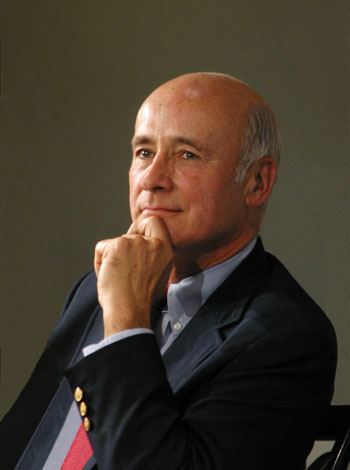
'Rumsfeld said, “I just don’t understand what it (Soft Power) means.” And my reaction to that is, it’s part of the problem.' Joseph Nye
http://www.ted.com/talks/lang/eng/joseph_nye_on_global_power_shifts.html
In this talk given by Joseph Nye he weaves his arguments in favour of the deployment of more effective 'Soft Power' into the fabric of current global shifts. In particular the predictions surrounding the rise to power of China. He points out that the predictions are inherently linear when in fact it is oversimplistic to look at economic indicators and say 'China will overtake the US in economic terms' by a certain date. These trends have to be attended to by politicians and diplomats in their 'Smart Power' assessments of current and future outcomes. 'Smart Power' is a development of 'soft power'. It is said that when 'Donald Rumsfeld first heard the phrase ('Soft Power') he didn't know what it meant' (Joel Whitney 2008). Furthermore China need not be the threat to world stability that she is sometimes portrayed in recent times. The key to how she is seen lies in cooperation and discussion around the table at the higher levels. This must also be coupled with the understanding that China's gain need not mean our loss. The 'zero sum game' obsession that some people like to vocalise internationally is becoming less applicable- I think this would be disputed between those with weight on the international stage. So Nye is saying to use part of the oft quoted Ethelbert Talbot saying; “The important thing... is not so much winning as taking part.” Nye states that recent discussions about the waning of US power are part of a periodic and ongoing discussion which has recurred with some regularity since 1958. He refers to the 'privatisation of war' almost casually as if this is a neo-liberal trend we will have to accept almost without question which I find contentious.
"We rarely speak of the soft power of attraction, of persuasion. Soft power is an analytical term, not a rallying cry, and perhaps that is why it has taken hold in academic and business discussions, and in other parts of the world like Europe, China, and India, but not in the American political debate." (How soft is smart, Joel Whitney interviews Joseph Nye, October 2008)In this way Nye points to 'Soft Power' being a tool or instrument of Public Diplomacy. The minimal use of coercion with 'carrots' and 'sticks' and the hidden powers of persuasion and attraction with the occasional political 'nudge' thrown in. The last is my addition to the lexicographical pantheon. (The current UK government are convinced that we can be behaviourally 'nudged' into doing the states bidding at home and abroad.) Nye is also stating in benign patrician tones that this has been the way forward for the US role in international affairs since the dark napalmed mornings of Vietnam and so far when Presidents have been aware of the term it has served the US better. Obama's soft power weapon from the outset was his ability to restore America's image internationally. However his success abroad in 'soft power' terms has been perceived by some at home in the US as a weakness by the gung-ho 'hard power' Neo-Con enthusiasts.
"It struck me that there was something intangible—ideas, values—and it struck me that humans are moved by ideas and values, and it may not be tangible or hard, but it’s still a form of power, and that led me to the idea of soft power." (Nye to Whitney, 2008)
I liked this is a neat and informed entry on the blog.
ReplyDeleteJust one point: by "the privatization of war", Nye doesn't mean the rise of private military corporations so much as the fact that due to globalisation small groups of individuals can wreck global havoc by crashing airliners into skyscrapers, for example. That would have been unthinkable seventy year back, when one would have required the resources of a state - and thus have been a public figure - to spark a global conflagration. So the trend towards privatization in this regards is not neoliberal.
I had not thought of that aspect of "privatization". Perhaps one could call it the "privatization of guerilla cell activity". It opens up a line of thought on the independence, or otherwise, of some guerilla outfits. Al Qaeda also known as 'the list' seemed to me to be a somewhat overly simplistic amalgam attached to Osama Bin Laden. The documentary 'The Power of Nightmares' talks about the inspirations and origins of 'Al Qaeda'.
ReplyDelete